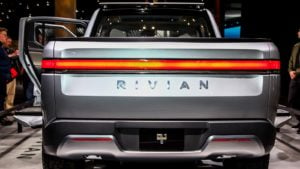Rivian’s (NASDAQ:RIVN) partnership with Amazon (NASDAQ:AMZN), along with the fact that three of the largest banks on the Street are likely to support its shares, make the outlook of RIVN stock positive.

What’s more, given the valuations of Lucid (NASDAQ:LCID) and Tesla (NASDAQ:TSLA), an argument can definitely be made that the current level of Rivian’s shares is actually far too low.
Finally, among the factors likely to boost Rivian’s results in the long-term are the continued, rapid growth of the e-commerce and food delivery markets.
Rivian has already received a huge order of roughly 100,000 EVs from Amazon within the next four years. The e-commerce giant had a total of 158,363,834 shares of Rivian, valued at $20,579,380,228.3 at the company’s closing price of $129.95 per share as of Nov. 12, according to TechCrunch reported.
So Amazon, one of the world’s largest shipping companies and one of the most valuable companies in the globe, has validated Rivian’s EVs by holding a great deal of RIVN stock after testing the vehicles.
As long as Amazon holds the shares, it has a significant financial incentive to keep buying Rivian’s EVs and to take other measures to keep the price of RIVN stock elevated.
A Closer Look at Rivian
Three of the largest banks on Wall Street also have a significant incentive to keep the EV maker’s stock price elevated. The underwriters of its IPO include Goldman Sachs (NYSE:GS) . JPMorgan Chase (NYSE:JPM), and Morgan Stanley (NYSE:MS).
Each of those underwriters received a 30-day option to purchase up to 22.95 million more shares at the IPO price, subtracting underwriting discounts and commissions.
It’s a good bet that all three of the huge underwriters recommended that their large clients buy RIVN stock at the IPO price of $78. Also among the major investors in pre-IPO Rivian were two more of the Street’s giants: Fidelity Investments and T. Rowe Price (NASDAQ:TROW).
Add together all of those giant banks, their clients and Amazon (not to mention the multiple hedge funds that also bought RIVN stock), and there is a tremendous amount of financial firepower that’s highly likely to work hard to prevent the shares from sliding significantly.
Consequently, in the absence of a major market correction, I would be very surprised if the company’s shares slip below $95. On good news, it would hardly be shocking if the stock climbs well above $200 within the next few months.
Rivian’s Valuation Isn’t as Stretched as Many Claim
As of Nov. 30, RIVN stock had a market capitalization of $106 billion, and, as I previously mentioned, it has received orders of about 100,000 EVs from Amazon.
Let’s conservatively say that Rivian ultimately receives orders for another 50,000 EVs from other companies that will be fulfilled by 2025. That works out to about $7o7,000 of market capitalization per EV ordered.
As of Nov. 15, Lucid had reported receiving orders for more than 17,000 EVs. Let’s say that it receives orders for 35,000 EVs that will be fulfilled by 2025.
The market capitalization of LCID stock as of Nov. 30 was $87 billion. With that estimate, the automaker’s market capitalization per EV ordered would be $2.5 million in my scenario.
Finally, in the 12 months that ended in September, Tesla sold over 800,000 EVs. Let’s say the company averages 1.3 million EVs sold between 2021 and 2025. That adds up to 6.5 million EVs sold. At the company’s market capitalization of $1.15 trillion, that works out to $177,000 per EV sold.
So in my scenario, Rivian’s market capitalization of EVs ordered is meaningfully below that of Lucid and significantly above that of Tesla. On the other hand, Rivian’s valuation is not many times higher than Tesla’s, and Tesla has been in business many more years than Rivian.
Unlike both Tesla and Lucid, Rivian is well-positioned to benefit from the tremendous growth of e-commerce and food delivery, as well as the tremendous backing of Amazon.
Finally, it seems to me that there’s much more competition in the main niche of Tesla and Lucid- high-price EVs for consumers – than in Rivian main niche of vans and delivery EVs.
The Bottom Line on RIVN Stock
Rivian’s shares should benefit tremendously from their support from many large banks and from Amazon. Meanwhile, in comparison to Lucid and Tesla, Rivian’s shares do not appear to be overvalued.
Given these points, as new orders likely roll in for RIVN stock over the next few months, there’s a good chance that the shares will surge to $200.
Although I think that Arrival (NASDAQ:ARVL) is a much better long-term investment than Rivian, given Arrival’s very low valuation and strong, upcoming catalysts, I encourage medium-term investors to buy Rivian’s shares.
On the date of publication, Larry Ramer held a long position in Arrival. The opinions expressed in this article are those of the writer, subject to the InvestorPlace.com Publishing Guidelines.
Larry Ramer has conducted research and written articles on U.S. stocks for 14 years. He has been employed by The Fly and Israel’s largest business newspaper, Globes. Larry began writing columns for InvestorPlace in 2015. Among his highly successful, contrarian picks have been GE, solar stocks, and Snap. You can reach him on StockTwits at @larryramer.
